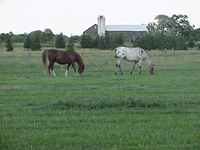During the past 25 years, the region's horse racing industry has faced many challenges including the advent of casino gambling, an increasingly popular state lottery, the 2001 closure of Garden State Park, and declining audiences at live races due to simulcasting. To compensate, states neighboring New Jersey are combining different wagering technologies with horse racing. Delaware, Pennsylvania, and New York already have either slot machines or video lottery terminals or they have recently passed legislation allowing them at racetracks. These efforts are attracting larger racetrack audiences and enhancing revenues.
Still, New Jersey's equine industry, composed predominately of pleasure breeds, accounts for an estimated 81,000 acres of farmland across the state. The state's breeding stock alone has an overall value of $168 million. Equine related assets including feed, bedding, fencing, equipment, transportation, insurance, blacksmith and veterinary services contribute $672 million to the state's economy annually.
As part of its efforts to support the equine industry, the New Jersey Department of Agriculture administers numerous disease control programs to help keep livestock healthy. The Department is a leader in the research on the West Nile Virus and its work has been used throughout the world to develop programs that address the disease.
In keeping with the goals outlined in its strategic plan, the Department continues to identify strategies to ensure the economic viability of the state's equine industry as well as the agricultural industry as a whole.
STRATEGIES
- Strengthen Breeder Reward Programs
- Amend legislation to allow "Thoroughbred Jersey Bred Breeder Awards" to be paid to owners and breeders racing in neighboring states. This would provide horsemen an opportunity to be paid for animals competing on a 12-month basis. Horses would be able to race in states contiguous to New Jersey 30 days after live racing ends here, and up to 30 days before live racing resumes.
- Encourage participation in a new breeder program established by the Standardbred Breeders and Owners Association of New Jersey as an incentive program to have mares reside in the state for nine months while in foal.
- Amend legislation to allow "Thoroughbred Jersey Bred Breeder Awards" to be paid to owners and breeders racing in neighboring states. This would provide horsemen an opportunity to be paid for animals competing on a 12-month basis. Horses would be able to race in states contiguous to New Jersey 30 days after live racing ends here, and up to 30 days before live racing resumes.
- Implement New Breeding Programs
- Establish a new thoroughbred breeding program, mirroring the Maryland Million, which would provide a full day of racing with purses totaling $1 million, giving breeders significant races to anticipate. Stallions standing in New Jersey would be nominated yearly, which would ensure their offspring would be eligible for nomination to the program. The offspring of an eligible stallion would be nominated as a weanling.
- Establish a new standardbred-breeding program for foals born in New Jersey.
- Establish a new thoroughbred breeding program, mirroring the Maryland Million, which would provide a full day of racing with purses totaling $1 million, giving breeders significant races to anticipate. Stallions standing in New Jersey would be nominated yearly, which would ensure their offspring would be eligible for nomination to the program. The offspring of an eligible stallion would be nominated as a weanling.
- Expand Research
- Work with Rutgers University's Cook College to continue development of a state-of-the-art research facility for its Equine Science Center. The Center is developing cost -effective techniques for nutrient and waste management to ensure the compatible co-existence of horse farms in urban and suburban environments.
- Work with Rutgers University's Cook College to continue development of a state-of-the-art research facility for its Equine Science Center. The Center is developing cost -effective techniques for nutrient and waste management to ensure the compatible co-existence of horse farms in urban and suburban environments.
- Restructure Revenues
- Revisit the existing statute that sets funding levels for various segments of the equine industry to ensure promotional and educational programs are adequately supported.
n Encourage Development of New Training Facility
- Facilitate and encourage development of a training facility for thoroughbreds. The closing of Garden State Park resulted in the loss of the only thoroughbred training facility in the state, forcing trainers to leave New Jersey at the end of racing season because they have no place to train or lodge for the winter.
- Revisit the existing statute that sets funding levels for various segments of the equine industry to ensure promotional and educational programs are adequately supported.
- Promote the Industry
- Bolster promotion and education efforts to stimulate interest, attract new owners and create career opportunities. These efforts will also help develop sales and marketing opportunities and support the expansion of The Horse Park of New Jersey at Stone Tavern Inc.
- Bolster promotion and education efforts to stimulate interest, attract new owners and create career opportunities. These efforts will also help develop sales and marketing opportunities and support the expansion of The Horse Park of New Jersey at Stone Tavern Inc.
- Assist in Addressing Labor Issues
- Continue the commitment to programs that support worker training, keep workers healthy and safe, and address issues such as farm labor housing.
- Support reform of policies and procedures addressing temporary agricultural worker visas at the federal and state level.
- Encourage farmers to take a pro-active approach to learning about their responsibilities at both the federal and state levels to ensure worker safety.
- Continue the commitment to programs that support worker training, keep workers healthy and safe, and address issues such as farm labor housing.



